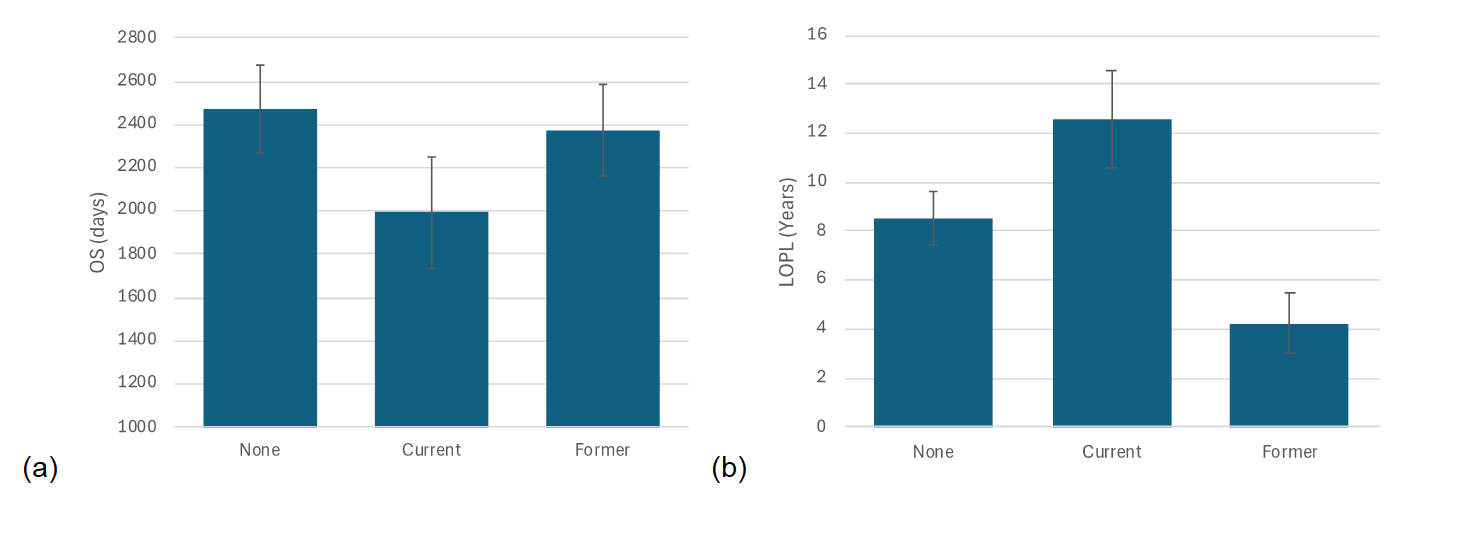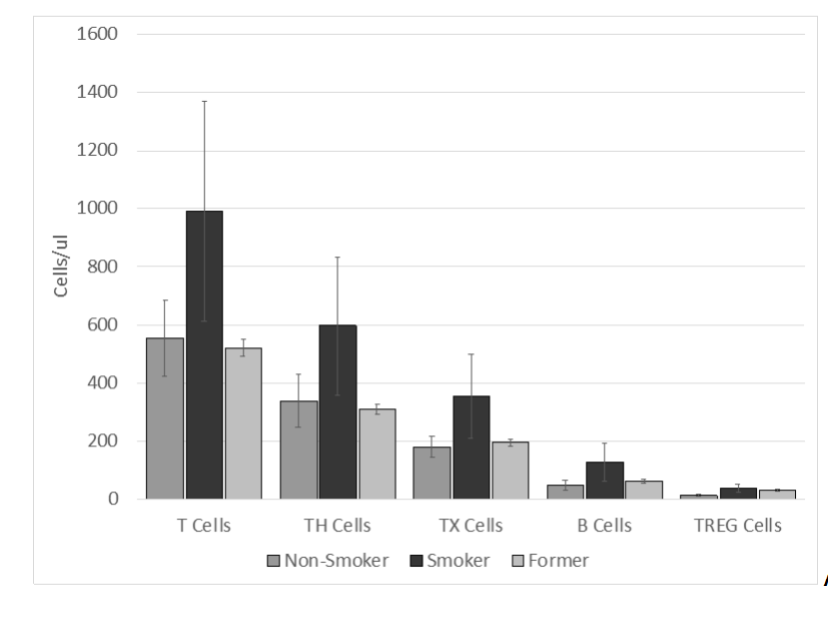Monday Poster Session
Category: Small Intestine
P4048 - Tobacco Cessation Improves Survival and Modulates Immune Profiles in Patients With Neuroendocrine Neoplasms
Monday, October 27, 2025
10:30 AM - 4:00 PM PDT
Location: Exhibit Hall
.jpg)
Farhan Mohiuddin, MD
Louisiana State University School of Medicine
New Orleans, LA
Presenting Author(s)
Farhan Mohiuddin, MD1, Nicholas Skill, PhD2, Yvette Mattison, PhD2, Mary Maluccio, MD2
1Louisiana State University School of Medicine, New Orleans, LA; 2Louisiana State University, New Orleans, LA
Introduction: Neuroendocrine neoplasms (NENs) are rare malignancies arising from neuroendocrine cells found throughout the body. While the association between tobacco use and many cancers is well-documented, its impact on NENs remains understudied. This study aimed to (1) quantify the impact of tobacco use and cessation on survival in NEN patients, and (2) investigate corresponding changes in adaptive immune cell profiles to uncover mechanistic insights into tobacco-related tumorigenesis and immune modulation.
Methods: Data from the LSU Health New Orleans NEN database were analyzed for 1,042 patients with self-reported tobacco use. Variables included tobacco status (never, current, former), overall survival (OS), loss of predicted life (LOPL), primary tumor site, T and B lymphocyte profiles, and patient demographics. Survival metrics and immune cell counts (CD4⁺ T helper, CD8⁺ cytotoxic T, T regulatory, and B cells) were compared using t-tests, ANOVA, and F-tests (p< 0.05 significant). The study was IRB-approved.
Results: Demographics: 57% reported no tobacco use; cessation rates were higher than national averages (35% vs. 9%). Black/African American patients had higher current smoking rates (11%) and lower cessation rates (25%) than White/Caucasians.
Survival: OS and LOPL were significantly inferior in current tobacco users (1994+/-589 days and 13+/-2 days respectively). Tobacco cessation was linked to an improvement in OS and LOPL (2374+/-209 and 4+/-1 years respectively).
Tumor Site: Tobacco exposure did not significantly correlate with NEN primary site, although exposure rates were highest in appendiceal (50%) and lowest in rectal (38%) NENs.
Immune Profiles: Current smokers had elevated T helper, cytotoxic T, T regulatory, and B cell levels compared to never and former smokers. Notably, TREG levels remained elevated in both current and former smokers, indicating persistent immune modulation post-cessation.
Discussion: Tobacco use in NEN patients is associated with earlier cancer onset, reduced survival, and dysregulation of immune cell populations. Importantly, tobacco cessation improved survival and partially restored immune cell profiles, supporting its role as a modifiable prognostic factor. These findings advocate for targeted cessation interventions and suggest that immune profiling may serve as a biomarker for cessation compliance and risk stratification in NEN care.

Figure: Figure 1: Overall survival, loss of predicted life, and tobacco use.

Figure: Figure 2: Lymphocytes profiles and tobacco exposure.
Disclosures:
Farhan Mohiuddin indicated no relevant financial relationships.
Nicholas Skill indicated no relevant financial relationships.
Yvette Mattison indicated no relevant financial relationships.
Mary Maluccio indicated no relevant financial relationships.
Farhan Mohiuddin, MD1, Nicholas Skill, PhD2, Yvette Mattison, PhD2, Mary Maluccio, MD2. P4048 - Tobacco Cessation Improves Survival and Modulates Immune Profiles in Patients With Neuroendocrine Neoplasms, ACG 2025 Annual Scientific Meeting Abstracts. Phoenix, AZ: American College of Gastroenterology.
1Louisiana State University School of Medicine, New Orleans, LA; 2Louisiana State University, New Orleans, LA
Introduction: Neuroendocrine neoplasms (NENs) are rare malignancies arising from neuroendocrine cells found throughout the body. While the association between tobacco use and many cancers is well-documented, its impact on NENs remains understudied. This study aimed to (1) quantify the impact of tobacco use and cessation on survival in NEN patients, and (2) investigate corresponding changes in adaptive immune cell profiles to uncover mechanistic insights into tobacco-related tumorigenesis and immune modulation.
Methods: Data from the LSU Health New Orleans NEN database were analyzed for 1,042 patients with self-reported tobacco use. Variables included tobacco status (never, current, former), overall survival (OS), loss of predicted life (LOPL), primary tumor site, T and B lymphocyte profiles, and patient demographics. Survival metrics and immune cell counts (CD4⁺ T helper, CD8⁺ cytotoxic T, T regulatory, and B cells) were compared using t-tests, ANOVA, and F-tests (p< 0.05 significant). The study was IRB-approved.
Results: Demographics: 57% reported no tobacco use; cessation rates were higher than national averages (35% vs. 9%). Black/African American patients had higher current smoking rates (11%) and lower cessation rates (25%) than White/Caucasians.
Survival: OS and LOPL were significantly inferior in current tobacco users (1994+/-589 days and 13+/-2 days respectively). Tobacco cessation was linked to an improvement in OS and LOPL (2374+/-209 and 4+/-1 years respectively).
Tumor Site: Tobacco exposure did not significantly correlate with NEN primary site, although exposure rates were highest in appendiceal (50%) and lowest in rectal (38%) NENs.
Immune Profiles: Current smokers had elevated T helper, cytotoxic T, T regulatory, and B cell levels compared to never and former smokers. Notably, TREG levels remained elevated in both current and former smokers, indicating persistent immune modulation post-cessation.
Discussion: Tobacco use in NEN patients is associated with earlier cancer onset, reduced survival, and dysregulation of immune cell populations. Importantly, tobacco cessation improved survival and partially restored immune cell profiles, supporting its role as a modifiable prognostic factor. These findings advocate for targeted cessation interventions and suggest that immune profiling may serve as a biomarker for cessation compliance and risk stratification in NEN care.

Figure: Figure 1: Overall survival, loss of predicted life, and tobacco use.

Figure: Figure 2: Lymphocytes profiles and tobacco exposure.
Disclosures:
Farhan Mohiuddin indicated no relevant financial relationships.
Nicholas Skill indicated no relevant financial relationships.
Yvette Mattison indicated no relevant financial relationships.
Mary Maluccio indicated no relevant financial relationships.
Farhan Mohiuddin, MD1, Nicholas Skill, PhD2, Yvette Mattison, PhD2, Mary Maluccio, MD2. P4048 - Tobacco Cessation Improves Survival and Modulates Immune Profiles in Patients With Neuroendocrine Neoplasms, ACG 2025 Annual Scientific Meeting Abstracts. Phoenix, AZ: American College of Gastroenterology.
